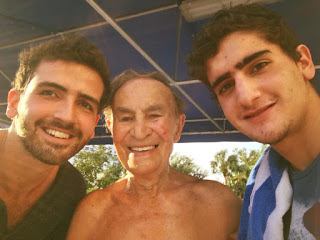This past weekend, I had a video call with my 7th grade teacher Luis Briceño. We have stayed in touch over the years, but after a few messages back and forth, he decided to call me on video. Lots of good memories came back, especially about what an amazing Educator he was- one of those inspiring people who came into my life at an early age, full of energy and creativity, and opened my eyes to a world beyond.
Today, my Profe, as we used to call him then, lives in Santiago, Chile, because the situation in Venezuela made some of the best professionals pack their bags, and look for new horizons. However challenging and new everything has been for him and his family, he continues to inspire. He called me to ask about the construction we do of housing and schools in Namibia, and understand better how he can push me beyond!
Over the past few weeks, he’s been encouraging me to watch a movie: “The Boy Who Harnessed the Wind”, available on Netflix. I didn’t watch it until after our call, and now I am hoping everyone will watch it.
On our video call, he asked me about the classrooms and schools Atenu Developments builds in remote towns and villages of Namibia. I explained that we look for donors and organizations in Namibia and around the world, who want to fund projects that our team then goes to implement in some of the areas with most need. We partner with the communities first, and work with their tribal and local leadership and parents to drive community meetings, whereby they talk amongst themselves about the importance of education, language, community, and whether building classrooms is what they really want. Hannah Laufer taught me this concept, we call it “Meeting Under a Tree”. This assured that teachers and foods will be provided by them and that the infrastructure is just a vehicle for that goal! In the end, it’s a project by them, for them, and we are just their partners.
I shared, in as much detail as I could, some of the hardships communities endure, but also shed light on the happiness and motivation of the many who live there. Every community’s project is unique, difficult and amazing. I told him about how hard it is to find materials, but how gratifying it is to make due; how challenging it is to employ people who never held a job, but how rewarding it is to see them develop; and finally, how powerful it is to see an entire generation of kids be empowered by the infinite tools of education. I left him with stories about the socio-economic drivers that inspire me and keep me up at night to want to help bring more education to some of these towns.
The Movie I saw took me off the grid for a whole day. It’s been a mix of emotions. For one, I recognize in that movie, many of the small towns and communities I have visited not only in Namibia, but throughout Africa. I recognize a sense of family and community that is unparalleled, and a commitment to ethics and parenthood that can’t be matched. I saw in the film, many of the communities I’ve visited, represented by values of hard-work, perseverance, endurance and faith. Unfortunately, I also saw the perils of poverty during droughts, or the fight for better access to education (infrastructure and funding). Today is Heroes Day in Namibia, and as we celebrate the heroes of independence, I wonder how do we continue to build more heroes from places where before it was thought impossible?
The movie left me thinking and questioning if we have done enough in the towns we have built classrooms, and anxious about all the towns we have not even reached. In the places we have built, have we collaborated enough to inspire, touch lives, recognize the children who go unnoticed? The ones who are left behind because their families could not afford to send them to study?
I invite everyone to watch that movie, and share your thoughts. But most importantly, find and touch as many villages and towns as you can... empower the youth of today with education, it’s the eminent answer to global poverty.
We are soon kicking off a construction project with the amazing Meryl Barry from the Pupkewitz Foundation at Okapembambu, in Northwest Namibia. Over 400 kids currently live and study there. The school is in a mountain, an hour drive from the closest supermarket. There is not one formal classroom; the current structures are shacks and mud houses. There is no electricty, and water is scarce. However, when we held our last planning visit (as we prepare building plans and community engagements), hundreds of kids received us singing and in happy spirits that can only uplift the soul.
We hope to build classrooms and hostels for all the kids.
I pray that we are able to not just build classrooms and hostels, but inspire and strengthen a generation of kids that will “harness the wind”. As I put pen to paper to plan this project, my worry is not longer about how will we manufacture the bricks or source the rest of the materials, but how effective will our impact be on every single boy and girl who’s yet to harness the wind.













